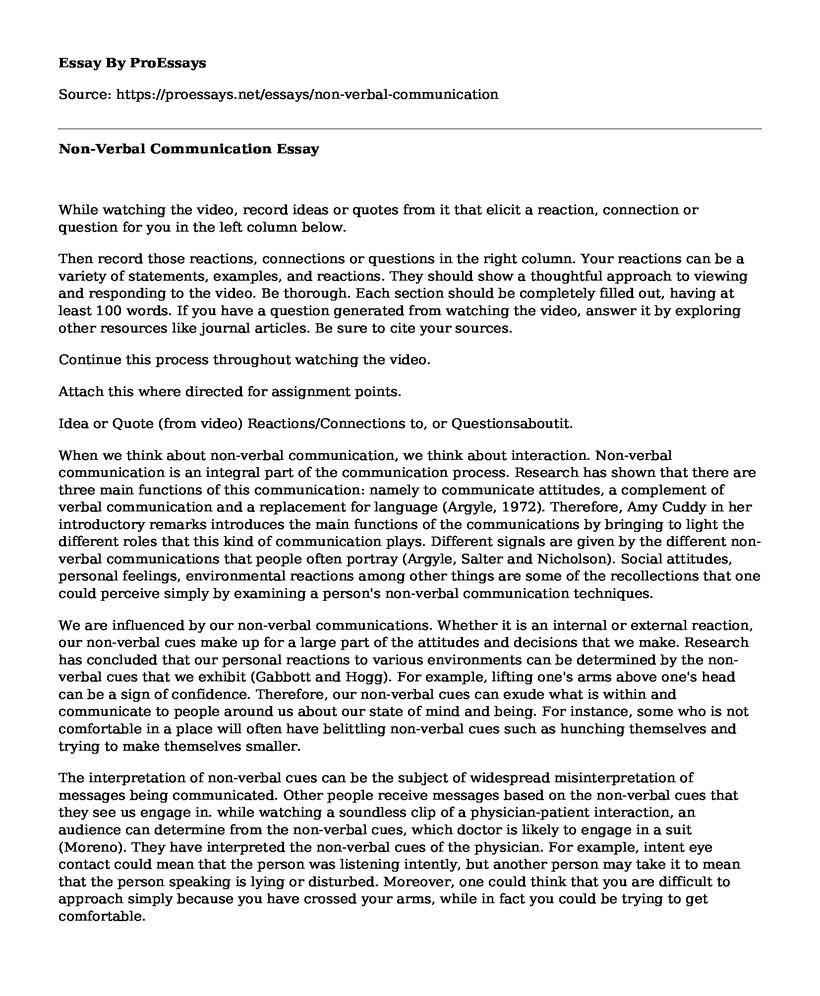While watching the video, record ideas or quotes from it that elicit a reaction, connection or question for you in the left column below.
Then record those reactions, connections or questions in the right column. Your reactions can be a variety of statements, examples, and reactions. They should show a thoughtful approach to viewing and responding to the video. Be thorough. Each section should be completely filled out, having at least 100 words. If you have a question generated from watching the video, answer it by exploring other resources like journal articles. Be sure to cite your sources.
Continue this process throughout watching the video.
Attach this where directed for assignment points.
Idea or Quote (from video) Reactions/Connections to, or Questionsaboutit.
When we think about non-verbal communication, we think about interaction. Non-verbal communication is an integral part of the communication process. Research has shown that there are three main functions of this communication: namely to communicate attitudes, a complement of verbal communication and a replacement for language (Argyle, 1972). Therefore, Amy Cuddy in her introductory remarks introduces the main functions of the communications by bringing to light the different roles that this kind of communication plays. Different signals are given by the different non-verbal communications that people often portray (Argyle, Salter and Nicholson). Social attitudes, personal feelings, environmental reactions among other things are some of the recollections that one could perceive simply by examining a person's non-verbal communication techniques.
We are influenced by our non-verbal communications. Whether it is an internal or external reaction, our non-verbal cues make up for a large part of the attitudes and decisions that we make. Research has concluded that our personal reactions to various environments can be determined by the non-verbal cues that we exhibit (Gabbott and Hogg). For example, lifting one's arms above one's head can be a sign of confidence. Therefore, our non-verbal cues can exude what is within and communicate to people around us about our state of mind and being. For instance, some who is not comfortable in a place will often have belittling non-verbal cues such as hunching themselves and trying to make themselves smaller.
The interpretation of non-verbal cues can be the subject of widespread misinterpretation of messages being communicated. Other people receive messages based on the non-verbal cues that they see us engage in. while watching a soundless clip of a physician-patient interaction, an audience can determine from the non-verbal cues, which doctor is likely to engage in a suit (Moreno). They have interpreted the non-verbal cues of the physician. For example, intent eye contact could mean that the person was listening intently, but another person may take it to mean that the person speaking is lying or disturbed. Moreover, one could think that you are difficult to approach simply because you have crossed your arms, while in fact you could be trying to get comfortable.
Our body can change our minds, which in turn change our behaviors and outcomes Body language is a determinant in trying to consider the possible outcomes that the person will have. Whether one frowns or laughs is not an external process, but an intricate process of body function. With a smile on ones face, behaviors will change. They will feel more positive and radiate happiness and excitement to perform different tasks. Making comments in class are accompanied by body changes that show readiness to give the answer. If the body posture doesnt change, the person may not be confident of their answer but would rather stay behind. The body thus controls the behavior the person will engage in, and thereafter the outcome that will be experienced.
Faking it till you become it. Asserting oneself towards a specific attitude for long periods of time will eventually find that you have become that something. This is because there is an elongated process of engagement in similar thinking about a specific attitude. As such, the person is able to constantly and daily program their mind concerning a particular objective. Eventually, one will have what they are confident about by making it their daily routine. Therefore, building a positive reputation about oneself that is based on achievement and overall effectiveness at the workplace or school eventually enables a person to have higher performance (Barcellona).
Works Cited
Argyle, M. Non-verbal communication in human social interaction. Oxford, England: Cambridge University Press, 1972.
Argyle, M., et al. "The Communication of Inferior and Superior Attitudes by Verbal and Nonverbal Signals*. , ." British journal of social and clinical psychology, 9(3) (1970): 222-231.
Barcellona, Lucia. Does The Fake It Till You Make It Attitude Actually Work? 2016. 13 May 2016 <http://theskooloflife.com/wordpress/does-the-fake-it-till-you-make-it-attitude-actually-work/>.
Gabbott, M. and G. Hogg. "An empirical investigation of the impact of non-verbal communication on service evaluation." European Journal of Marketing, 34(3/4) (2000): 384-398.
Moreno, Dario. Can Non-verbal Communication Change Who We Are? 2013. 11 May 2016 <https://openbmic.com/2013/07/03/nonverbal/>.
Cite this page
Non-Verbal Communication. (2021, Mar 14). Retrieved from https://proessays.net/essays/non-verbal-communication
If you are the original author of this essay and no longer wish to have it published on the ProEssays website, please click below to request its removal:
- Interdisciplinary Collaboration to Select a Clinical Measure
- How Does the Traditional or Cultural Belief Influence the Prevalence of Mental Health in Individuals
- Essay Sample on Psychotherapy: Models I'm Comfortable With & Those I'm Not
- Harlem: Thriving in Literature, Music, and Art - Essay Sample
- Essay Example on Mental Health: Complex, Universal and Prevalent
- Paper Example on Overcoming Social Anxiety: 8 Days to Change My Life
- Essay Sample on Cultural Diversity in Counseling: Impact on Client-Counselor Relationships







